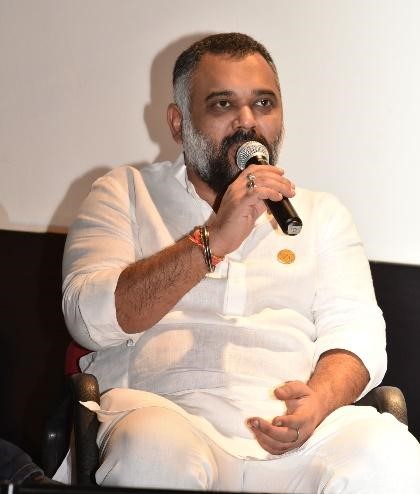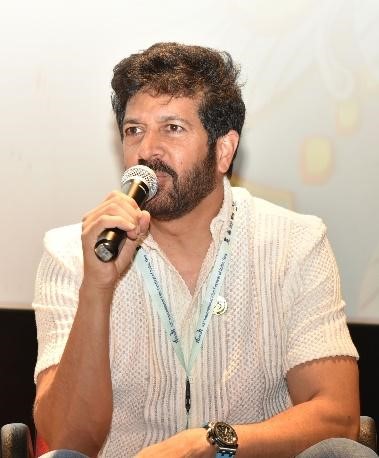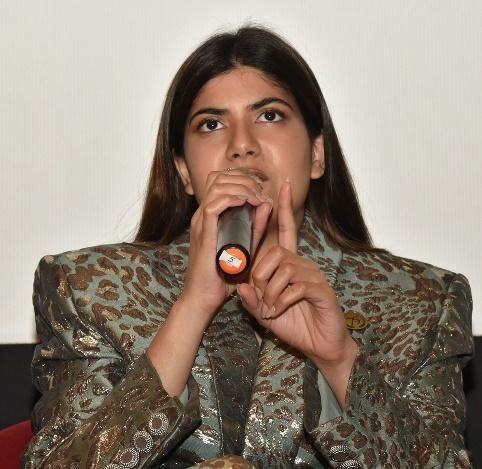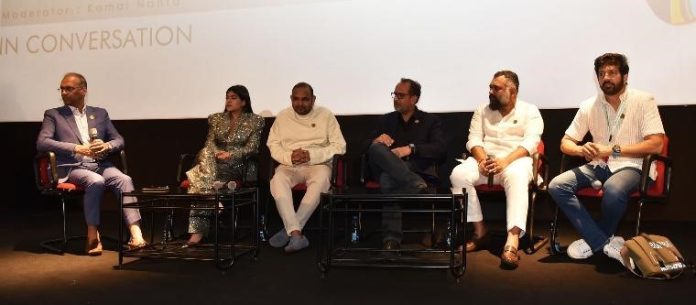Nepotism can get you first film, but it’s your work that speaks for you: Director Luv Ranjan
Director Luv Ranjan, at an ‘In-Conversation session’ on ‘Changing Phase of Entertainment Industry and How to Break into this Industry’ at the 53rd International Film Festival of India at Goa, said “I feel nepotism is an inheritance of relationships. But in the industry, it becomes a sour topic. Even if your parents are from the industry, all it gets you is your first film, or maybe your second film. But after that, it’s your work that speaks for you. A lot of newcomers have the “victim syndrome”. We get stuck up in the notion that I’m good. But it doesn’t mean that others are bad. People don’t realize that filmmaking cannot be detached from business.”
 Director Luv Ranjan at ‘In-Conversation’ session at IFFI 53
Director Luv Ranjan at ‘In-Conversation’ session at IFFI 53
Director Kabir Khan recounted an incident from his days as a documentary filmmaker, which later became the opening shot of his first film, ‘Kabul Express’. He said “Bollywood saved my life, and that’s when I decided that there was no medium more powerful than the films. And I need to be there to tell my stories. I often tell youngsters that you need to have uniqueness in your voice. I tell my students that when I see a film, I should be able to say that this can only be made by him/her.”
Responding to a question on nepotism and the newcomers coming into the industry, the ace director said, “It takes time to reach the right people. I came to Mumbai with just a script. You have to persevere but also be realistic. Often, I meet people who hang on to one idea for 4-5 years. Maybe there’s a problem with the script; maybe the time hasn’t come for it.”
 Director Kabir Khan at ‘In-Conversation’ session at IFFI 53
Director Kabir Khan at ‘In-Conversation’ session at IFFI 53
Film producer Mahaveer Jain has brought a lot of filmmakers under one umbrella, whose resolve is to hone and give a break to the new talent. He elaborated that the idea came to him upon meeting various filmmakers who expressed the desire to do something for the newcomers. He also shared, “We will shortly be launching an app through which the newcomers will be able to reach out to the filmmakers.”
Ananya Birla upon being asked about her journey as a singer and an actor replied, “I come from an industrial, conservative family, so it was a big stigma for me to be an actor. Initially, I received a lot of hate because people thought that my father had paid for my singing career. But it took a hard four years for me to prove myself, and to get loved for who I am. She added that while she was in LA, she saw her culture from outsiders’ perspective and decided to use her roots to take our sound to the global audience.”
 Ananya Birla at ‘In-Conversation’ session at IFFI 53
Ananya Birla at ‘In-Conversation’ session at IFFI 53
Director Aanand L. Rai, upon being asked as to how difficult it is to take chances with newcomers, replied “All the big filmmakers present over here were also newcomers once. I think this industry has always been open to newcomers. I don’t think the relationship between makers and newcomers has been affected by the arrival of multiplexes.”
Replying to the question on the pointers on which newcomers can gauge whether they have the USP or not Director Aanand L. Rai replied, “To know that you’ll have to get out there and express yourself whether it be an audition or a script. It’s not important whether you’re like somebody else or not. There’s no one like me is good enough.”
Director Aanand L. Rai quipped, “It’s very important that we catch hold of the new talent. Every 5-10 years, we feel the shortage of new actors, scriptwriters, directors, etc.”
The discussion then veered towards whether OTT platforms are more open to giving a chance to newcomers as compared to production houses. Director Kabir Khan replied, “I feel OTT platforms have been more courageous in taking on projects with newcomers.”
Ananya Birla talking about her own production company said, ”For us, it’s about having a good mix. We have a bespoke kind of model wherein we work in-house before pitching to OTT platforms.”
Director Luv Ranjan added,” The audience is more willing to see new people after paying a subscription fee. But frankly, the situation is much better than the last 20 years. Forget the audience; it becomes a nightmare to get the media to cover a film with newcomers. It’s a consumer market after all.” Film analyst Komal Nahata moderated the In-Conversation session.
The Masterclasses and In-Conversation sessions are being organised jointly by Satyajit Ray Film and Television Institute (SRFTI), NFDC, Film and Television Institute of India (FTII) and ESG. A total of 23 sessions comprising masterclasses and in-conversations are being conducted this year to encourage the students and enthusiasts of cinema in every aspect of filmmaking.






